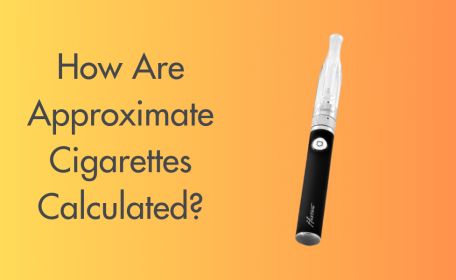← Back
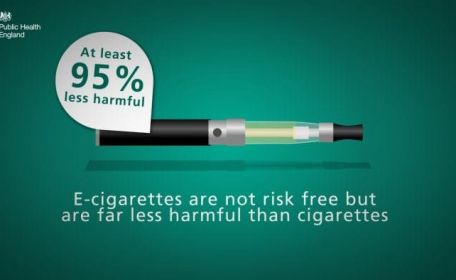
2018: A Year in UK Vaping Progression

The world of vaping in the United Kingdom started 2018 with a bang — tremendous news for supporters and lovers of e-cigarettes who have used them to reclaim control over their lives by finally unshackling themselves from the fierce burden of tobacco and all the unhealthy and downright deadly risks it carries. It came from one of the highest medical authorities in the land, Public Health England (PHE), and as the otherwise tumultuous year rolled on and Britain remained convulsed by the divisions, fevers and vast uncertainties brought about by Brexit, the news continued to get even better for vaping.
It was one of the best 12 months for e-cigarettes this country has ever seen. And it comes at a time when most other countries are either stalling or going backwards in their efforts to arrest what is the largest global public health crisis, which kills millions of people every year — by urging smokers to vape instead. "The tobacco epidemic is one of the biggest public health threats the world has ever faced, killing more than 7 million people a year," says the World Health Organization. "More than 6 million of those deaths are the result of direct tobacco use while around 890,000 are the result of non-smokers being exposed to secondhand smoke."
Here in the UK, we do things differently, and at Electric Tobacconist UK, we closely followed all the news and developments about vaping during the year, in addition to supporting campaigns to help get people off cigarettes, attending vaping conferences and speaking to leaders who are helping to propel this rapidly expanding sector forward. We conducted interviews with everyone from prison authorities that are using vaping to keep their formerly smoking inmates happy to global health chiefs with responsibility for tobacco and vaping advisories around the world. We do this so that we are better informed about what we do and offer to our customers, and as part of our ongoing efforts to inform people about vaping in a reliable, credible and professional manner via our popular blog.
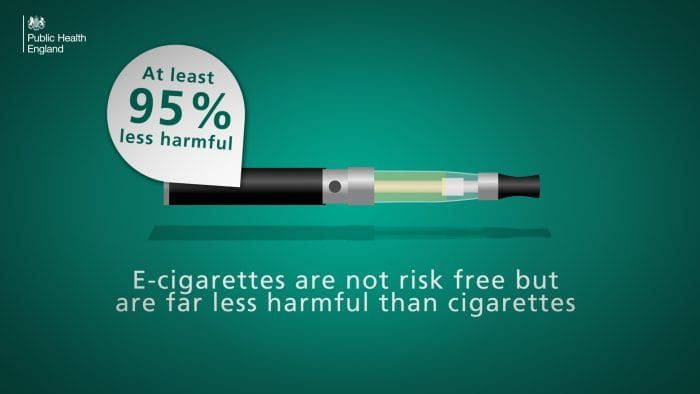 E-cigarette Check-up: Public Health England examined vaping devices and found they were almost entirely harmless compared to the real risks of tobacco cigarettes. [/caption]
E-cigarette Check-up: Public Health England examined vaping devices and found they were almost entirely harmless compared to the real risks of tobacco cigarettes. [/caption]
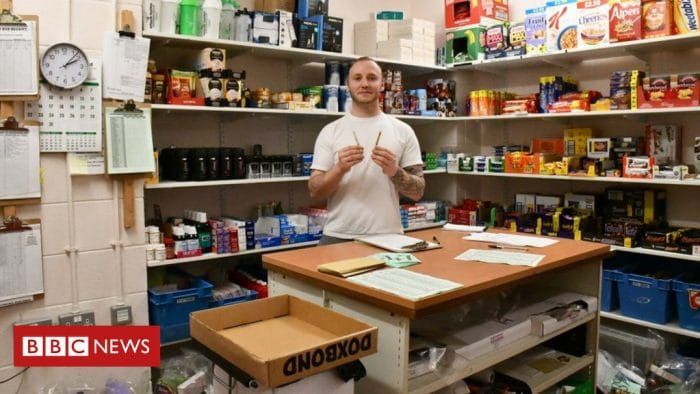 Jail Break: Inmates at the Isle of Man Prison were able to purchase e-cigarettes in the jail shop after smoking was banned. (Photo by Isle of Man Government)[/caption]
When the prison governor, Bob McColm, decided to launch a trial scheme in which smokers could buy e-cigarettes at the prison shop, the once-perilous situation at the medium-security facility changed dramatically — and for the better.
Now that former smokers were able to get the nicotine they desired, they were calmer and no longer resorting to dangerous tactics to light up. The prison saw a 58% fall in warnings given to inmates and a 42% drop in offender adjudication, while power cuts fell by half, a quarter of new prisoners asked for help to stop smoking and the prison saved around £8,500 a year on nicotine replacement therapies.
One prisoner, identified only as Dave, said he managed to stop smoking behind bars by vaping instead. "I'm 29 now and I've been smoking since I was 13. It's a good environment to quit smoking, especially now that e-cigarettes have come in," he said.
"The e-cigarette pilot scheme at Jurby prison is a major success story for the Isle of Man. A problem has been solved," said the governor. "We have better behaviour, [and] a calmer, cleaner and safer environment. Impressive numbers of offenders have asked for help to stop smoking altogether — an unexpected bonus [that] will drive our future approach."
Jail Break: Inmates at the Isle of Man Prison were able to purchase e-cigarettes in the jail shop after smoking was banned. (Photo by Isle of Man Government)[/caption]
When the prison governor, Bob McColm, decided to launch a trial scheme in which smokers could buy e-cigarettes at the prison shop, the once-perilous situation at the medium-security facility changed dramatically — and for the better.
Now that former smokers were able to get the nicotine they desired, they were calmer and no longer resorting to dangerous tactics to light up. The prison saw a 58% fall in warnings given to inmates and a 42% drop in offender adjudication, while power cuts fell by half, a quarter of new prisoners asked for help to stop smoking and the prison saved around £8,500 a year on nicotine replacement therapies.
One prisoner, identified only as Dave, said he managed to stop smoking behind bars by vaping instead. "I'm 29 now and I've been smoking since I was 13. It's a good environment to quit smoking, especially now that e-cigarettes have come in," he said.
"The e-cigarette pilot scheme at Jurby prison is a major success story for the Isle of Man. A problem has been solved," said the governor. "We have better behaviour, [and] a calmer, cleaner and safer environment. Impressive numbers of offenders have asked for help to stop smoking altogether — an unexpected bonus [that] will drive our future approach."
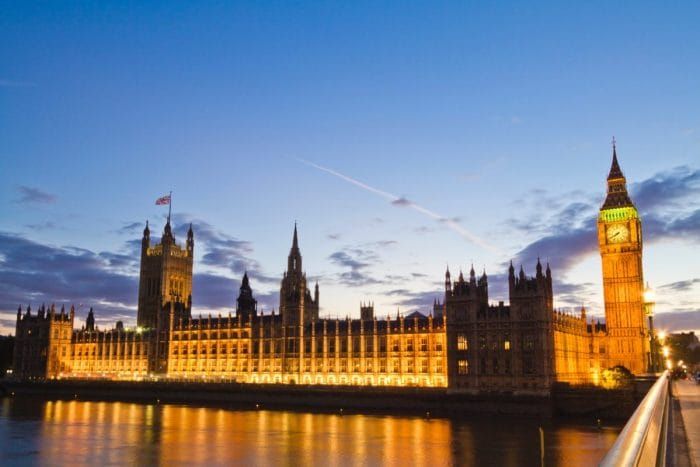 Big When: Will the UK parliament take up lawmakers' advice and allow vaping in offices and on public transport? (Photo by Michael D Beckwith on Unsplash)[/caption]
The committee also wants more freedom to advertise vaping gear as a less harmful alternative to smoking, as currently, advertising e-cigarettes in mass media like TV and newspaper is banned. The parliamentarians also called for an end to restrictions on e-liquid nicotine strengths and tank sizes, while urging the government to carry out a long-term research programme into the use of e-cigarettes.
Committee chairman Norman Lamb said it was time for wider society to embrace vaping.
"Smoking remains a national health crisis and the government should be considering innovative ways of reducing the smoking rate," he said. "E-cigarettes are less harmful than conventional cigarettes, but current policy and regulations do not sufficiently reflect this and businesses, transport providers and public places should stop viewing conventional and e-cigarettes as one and the same. There is no public health rationale for doing so."
Big When: Will the UK parliament take up lawmakers' advice and allow vaping in offices and on public transport? (Photo by Michael D Beckwith on Unsplash)[/caption]
The committee also wants more freedom to advertise vaping gear as a less harmful alternative to smoking, as currently, advertising e-cigarettes in mass media like TV and newspaper is banned. The parliamentarians also called for an end to restrictions on e-liquid nicotine strengths and tank sizes, while urging the government to carry out a long-term research programme into the use of e-cigarettes.
Committee chairman Norman Lamb said it was time for wider society to embrace vaping.
"Smoking remains a national health crisis and the government should be considering innovative ways of reducing the smoking rate," he said. "E-cigarettes are less harmful than conventional cigarettes, but current policy and regulations do not sufficiently reflect this and businesses, transport providers and public places should stop viewing conventional and e-cigarettes as one and the same. There is no public health rationale for doing so."
 Road to Quitting Success: A Stoptober mobile billboard urging smokers to give up during October by, among other solutions, vaping instead. (Photo by Public Health Action)[/caption]
Stoptober also tried to ram home PHE's message that nicotine is not the enemy — rather, it’s everything else in burning tobacco. "Many people think nicotine is very harmful to health. In fact, although it is addictive, nicotine is relatively harmless," it said. The campaign reassured smokers that e-cigarettes can certainly help people giving up tobacco to manage their nicotine cravings because they're still getting nicotine in their vapes — and that it's important to choose the strength that's right for individual smokers so that they get the best e-cig for them: too little nicotine and they might give up e-cigs and relapse to smoking.
Road to Quitting Success: A Stoptober mobile billboard urging smokers to give up during October by, among other solutions, vaping instead. (Photo by Public Health Action)[/caption]
Stoptober also tried to ram home PHE's message that nicotine is not the enemy — rather, it’s everything else in burning tobacco. "Many people think nicotine is very harmful to health. In fact, although it is addictive, nicotine is relatively harmless," it said. The campaign reassured smokers that e-cigarettes can certainly help people giving up tobacco to manage their nicotine cravings because they're still getting nicotine in their vapes — and that it's important to choose the strength that's right for individual smokers so that they get the best e-cig for them: too little nicotine and they might give up e-cigs and relapse to smoking.
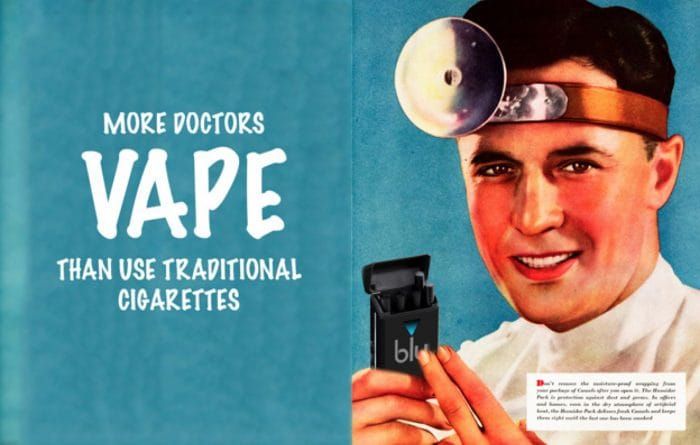 The primary reason respondents gave the ASA for axing its ban on vaping health claims in ads was what we started off with in this blog — PHE's updated advisory on e-cigarettes. They also pointed to an earlier study, from just over two years ago, from the Royal College of Physicians in London, which also closely examined e-cigarettes and concluded they had an enormous health benefit compared to smoking and therefore should be "widely promoted."
Those against a lifting of the ban said there had been no studies conducted into the long-term effects of vaping and, therefore, it may be too risky to allow health claims in e-cigarette ads. Perhaps, though, they were unaware of a major long-term study published at the start of 2018, which followed vapers for two years and found "no adverse health impacts" from using e-cigarettes. At any rate, the ASA went ahead and overturned its ban.
It's been an incredible year for vaping in the UK — helping to get people off destructive tobacco and on track to happier, more productive and far healthier lives. From all of us here at Electric Tobacconist UK, we wish you a very happy Christmas, and peace and prosperity for 2019.
The Electric Tobacconist online vape shop is always open for you to get great new vapes and e-liquid refills with amazing convenience, free* delivery and always the very best prices. Explore our vaping superstore now and get your vape gear on.
*on orders over £10 in the UK mainland and more than £150 on the European continent.
The primary reason respondents gave the ASA for axing its ban on vaping health claims in ads was what we started off with in this blog — PHE's updated advisory on e-cigarettes. They also pointed to an earlier study, from just over two years ago, from the Royal College of Physicians in London, which also closely examined e-cigarettes and concluded they had an enormous health benefit compared to smoking and therefore should be "widely promoted."
Those against a lifting of the ban said there had been no studies conducted into the long-term effects of vaping and, therefore, it may be too risky to allow health claims in e-cigarette ads. Perhaps, though, they were unaware of a major long-term study published at the start of 2018, which followed vapers for two years and found "no adverse health impacts" from using e-cigarettes. At any rate, the ASA went ahead and overturned its ban.
It's been an incredible year for vaping in the UK — helping to get people off destructive tobacco and on track to happier, more productive and far healthier lives. From all of us here at Electric Tobacconist UK, we wish you a very happy Christmas, and peace and prosperity for 2019.
The Electric Tobacconist online vape shop is always open for you to get great new vapes and e-liquid refills with amazing convenience, free* delivery and always the very best prices. Explore our vaping superstore now and get your vape gear on.
*on orders over £10 in the UK mainland and more than £150 on the European continent.
Leading the Way for Public Health
In February, PHE published an updated advisory on vaping following initial advice issued three years earlier, which it admitted had been daring in its backing of e-cigarettes as an effective smoking-cessation method — one that caused people around the world to think again and start taking vaping seriously as a public health aid. "Back in 2015, the bold conclusions of our previous e-cigarette report were controversial in providing qualified support for the use of [electronic cigarettes] but have since contributed to a shift in international opinion," the advisory body said. So what did PHE say in its vaping update? The main takeaways following further investigations into e-cigarettes by a panel of leading and independent tobacco experts found that "vaping poses only a small fraction of the risks of smoking and switching completely from smoking to vaping conveys substantial health benefits" and that "e-cigarettes could be contributing to at least 20,000 successful new quits per year and possibly many more." The tobacco experts also discovered during their evidence review that there had been an improved success rate in people quitting smoking by taking up vaping instead, and that this had led to a rapid fall in smoking rates around the UK.One of the barriers to smokers turning to vaping, however, is that many people hooked on cigarettes wrongly believe vaping is just as bad for their health, the experts said, and this has caused smokers to not even try e-cigarettes because they feel there would be no benefit. Compounding the issue, they said there was also a great deal of misunderstanding among the public about nicotine — a highly addictive substance that smokers only really want from their cigarettes but one that's among the least harmful of the many thousands of toxic chemicals given off by burning tobacco, at least 70 of which are known to cause various cancers in the human body. "Our new review reinforces the finding that vaping is a fraction of the risk of smoking, at least 95% less harmful, and of negligible risk to bystanders. Yet over half of smokers either falsely believe that vaping is as harmful as smoking or just don’t know," said PHE's health improvement director, Professor John Newton. "It would be tragic if thousands of smokers who could quit with the help of an e-cigarette are being put off due to false fears about their safety." Fears that e-cigarettes might also be a gateway to smoking among young people trying to get the best e-cig from an online vape shop or elsewhere were also unfounded, the PHE review said, because there was no evidence to support such claims. In fact, it said, youth smoking rates around Britain continue to fall, regular use of e-cigarettes among young people is rare and most of the circa 3 million people who vape in the UK today are former smokers. PHE advised NHS hospitals that in order to become "truly smoke-free", they should ensure that e-cigarettes are made available for purchase in shops on hospital grounds — in case patients didn’t manage to get supplies from an online vape shop, for instance — and that they should also institute vaping policies that support smokers in their battles to quit cigarettes and keep them off them for good. And places where smokers light up around hospitals, especially outdoor smoking shelters, should be removed so that smoking would be discouraged. [caption id="attachment_1736" align="aligncenter" width="700"]Our animation shows the difference between e-cigarettes and cigarettes. Read our blog on our latest evidence update here: https://t.co/cXLh82thcd #EcigEvidence pic.twitter.com/OpgCZ3aSbD
— Public Health England (@PHE_uk) February 6, 2018
 E-cigarette Check-up: Public Health England examined vaping devices and found they were almost entirely harmless compared to the real risks of tobacco cigarettes. [/caption]
E-cigarette Check-up: Public Health England examined vaping devices and found they were almost entirely harmless compared to the real risks of tobacco cigarettes. [/caption]
It Was All Happening in VApril
Not long after the PHE's second backing of e-cigarettes as a way to stop smoking and live a healthier life, one of the UK's top TV medics, Dr Christian Jessen, leaped into life to announce the first ever nationwide vaping awareness and education campaign, catchily titled VApril. Organised by our good friends at the UK Vaping Industry Association — a representative body comprising vaping manufacturers, distributors and retailers, and of which we are a member — it was designed to help people stub out smoking for good by switching to vaping. People around the UK were encouraged to "Take the VApril Challenge", a three-step programme that included attending a Vaping Masterclass in selected cities. There, they would learn about the wide and growing range of e-cigarette devices, as well as the e-liquids they contain, and receive free and expert advice about how to start vaping and what nicotine level to opt for in e-liquid, so that smokers of various cigarette usage — heavy, social or light — would get the best e-cig for them and not want to revert to cigarettes. The second step in the VApril challenge involved a free guide called Vape to Break the Smoking Habit, which offered tips on the best ways to transition from smoking to vaping, the different nicotine strengths in e-liquid, a tutorial on the components of vape devices and facts that would help smokers to quit. The final part of the programme encouraged those taking part to Be Social and share their experience on social media, using the hashtags #VApril and #VAprilChallenge. The month-long campaign to help wean people off cigarettes was declared a terrific success, after around 12,000 people viewed the campaign's videos, some 1,000 smokers took up the VApril masterclasses and 34,000 education packs and flyers were printed and sent off. The campaign also managed to engage with a total of 321 politicians and professionals in the public arena to help get the vaping message out.Vaping: All Locked Up
During the year, we heard of an interesting tale coming out of — of all places — the sole prison on the tiny Isle of Man (population: 84,287). Prisons across the UK banned cigarette smoking for the good of prisoners' and staff's health, although last year, the Supreme Court ruled that it could not be enforced in jails and on other crown premises. The prohibition came into force in Isle of Man prison in 2008, and had the unfortunate effect of edgy prisoners turning to all sorts of homemade remedies to try to get their nicotine fix. We wanted to know more, so we had our sleuths get in touch with the Isle of Man government directly, and what we discovered was shocking. It turned out that the inmates had been driven into such a state of heightened anger and desperation as they went through the terrors of nicotine withdrawal that they were using anything from banana skins to tea bags and nicotine patches to make rudimentary cigarettes in an attempt to get their smoking hit. And if that wasn't bad enough, they were also engaging in some seriously risky behaviour — trying to light their homemade cigarettes using power sockets, kettles and anything else electrical they could get their hands on. Fiddling around with these high-voltage outlets and appliances invariably led to short circuiting and rolling power cuts. In all, a staggering more than 800 blackouts due to attempts at lighting illicit "cigarettes" were recorded in the prison. [caption id="" align="aligncenter" width="700"] Jail Break: Inmates at the Isle of Man Prison were able to purchase e-cigarettes in the jail shop after smoking was banned. (Photo by Isle of Man Government)[/caption]
When the prison governor, Bob McColm, decided to launch a trial scheme in which smokers could buy e-cigarettes at the prison shop, the once-perilous situation at the medium-security facility changed dramatically — and for the better.
Now that former smokers were able to get the nicotine they desired, they were calmer and no longer resorting to dangerous tactics to light up. The prison saw a 58% fall in warnings given to inmates and a 42% drop in offender adjudication, while power cuts fell by half, a quarter of new prisoners asked for help to stop smoking and the prison saved around £8,500 a year on nicotine replacement therapies.
One prisoner, identified only as Dave, said he managed to stop smoking behind bars by vaping instead. "I'm 29 now and I've been smoking since I was 13. It's a good environment to quit smoking, especially now that e-cigarettes have come in," he said.
"The e-cigarette pilot scheme at Jurby prison is a major success story for the Isle of Man. A problem has been solved," said the governor. "We have better behaviour, [and] a calmer, cleaner and safer environment. Impressive numbers of offenders have asked for help to stop smoking altogether — an unexpected bonus [that] will drive our future approach."
Jail Break: Inmates at the Isle of Man Prison were able to purchase e-cigarettes in the jail shop after smoking was banned. (Photo by Isle of Man Government)[/caption]
When the prison governor, Bob McColm, decided to launch a trial scheme in which smokers could buy e-cigarettes at the prison shop, the once-perilous situation at the medium-security facility changed dramatically — and for the better.
Now that former smokers were able to get the nicotine they desired, they were calmer and no longer resorting to dangerous tactics to light up. The prison saw a 58% fall in warnings given to inmates and a 42% drop in offender adjudication, while power cuts fell by half, a quarter of new prisoners asked for help to stop smoking and the prison saved around £8,500 a year on nicotine replacement therapies.
One prisoner, identified only as Dave, said he managed to stop smoking behind bars by vaping instead. "I'm 29 now and I've been smoking since I was 13. It's a good environment to quit smoking, especially now that e-cigarettes have come in," he said.
"The e-cigarette pilot scheme at Jurby prison is a major success story for the Isle of Man. A problem has been solved," said the governor. "We have better behaviour, [and] a calmer, cleaner and safer environment. Impressive numbers of offenders have asked for help to stop smoking altogether — an unexpected bonus [that] will drive our future approach."
A Commons Piece of Advice
The year was rolling on, and during the unexpected and prolonged heat wave we all enjoyed, there was no end to the positive news in the UK about vaping. In August, a group of parliamentarians declared that the government was "missing an opportunity with e-cigarettes" due to the public health benefit compared to smoking, and suggested that the use of e-cigs be allowed in such public places as offices, and on trains and buses. The lawmakers, from parliament's Science and Technology Committee, reviewed evidence on the potential hazards to health of e-cigarettes compared to tobacco cigarettes, including the former's use in prisons and NHS mental health institutions, and concluded that "e-cigarettes should not be treated in the same way as conventional cigarettes." "E-cigarettes, estimated as 95% less harmful than conventional cigarettes, are too often being overlooked as a stop smoking tool by the NHS. Regulations should be relaxed relating to e-cigarettes’ licensing, prescribing and advertising of their health benefits. Their level of taxation and use in public places must be reconsidered," said the committee’s report. [caption id="attachment_1743" align="aligncenter" width="700"] Big When: Will the UK parliament take up lawmakers' advice and allow vaping in offices and on public transport? (Photo by Michael D Beckwith on Unsplash)[/caption]
The committee also wants more freedom to advertise vaping gear as a less harmful alternative to smoking, as currently, advertising e-cigarettes in mass media like TV and newspaper is banned. The parliamentarians also called for an end to restrictions on e-liquid nicotine strengths and tank sizes, while urging the government to carry out a long-term research programme into the use of e-cigarettes.
Committee chairman Norman Lamb said it was time for wider society to embrace vaping.
"Smoking remains a national health crisis and the government should be considering innovative ways of reducing the smoking rate," he said. "E-cigarettes are less harmful than conventional cigarettes, but current policy and regulations do not sufficiently reflect this and businesses, transport providers and public places should stop viewing conventional and e-cigarettes as one and the same. There is no public health rationale for doing so."
Big When: Will the UK parliament take up lawmakers' advice and allow vaping in offices and on public transport? (Photo by Michael D Beckwith on Unsplash)[/caption]
The committee also wants more freedom to advertise vaping gear as a less harmful alternative to smoking, as currently, advertising e-cigarettes in mass media like TV and newspaper is banned. The parliamentarians also called for an end to restrictions on e-liquid nicotine strengths and tank sizes, while urging the government to carry out a long-term research programme into the use of e-cigarettes.
Committee chairman Norman Lamb said it was time for wider society to embrace vaping.
"Smoking remains a national health crisis and the government should be considering innovative ways of reducing the smoking rate," he said. "E-cigarettes are less harmful than conventional cigarettes, but current policy and regulations do not sufficiently reflect this and businesses, transport providers and public places should stop viewing conventional and e-cigarettes as one and the same. There is no public health rationale for doing so."
Stop(tober) and Think about Vaping
Last year was the first time the NHS openly embraced e-cigarettes as a highly effective way to get people off cigarettes. That was during its annual Stoptober stop-smoking campaign. This year, it went even bigger on vaping and expanded its advice on using e-cigarettes to stop smoking during October. The NHS said vapes could be "particularly effective as a stop-smoking aid" when smokers were getting one-on-one support from stop-smoking experts at the same time. "Thousands of people in England have already stopped smoking with the help of an e-cigarette. Plus, those who combine an e-cigarette with help from their local Stop Smoking Service have a high chance of success. In 2017-18, two-thirds of smokers who did so managed to stop smoking," the campaign said. [caption id="attachment_1744" align="aligncenter" width="700"] Road to Quitting Success: A Stoptober mobile billboard urging smokers to give up during October by, among other solutions, vaping instead. (Photo by Public Health Action)[/caption]
Stoptober also tried to ram home PHE's message that nicotine is not the enemy — rather, it’s everything else in burning tobacco. "Many people think nicotine is very harmful to health. In fact, although it is addictive, nicotine is relatively harmless," it said. The campaign reassured smokers that e-cigarettes can certainly help people giving up tobacco to manage their nicotine cravings because they're still getting nicotine in their vapes — and that it's important to choose the strength that's right for individual smokers so that they get the best e-cig for them: too little nicotine and they might give up e-cigs and relapse to smoking.
Road to Quitting Success: A Stoptober mobile billboard urging smokers to give up during October by, among other solutions, vaping instead. (Photo by Public Health Action)[/caption]
Stoptober also tried to ram home PHE's message that nicotine is not the enemy — rather, it’s everything else in burning tobacco. "Many people think nicotine is very harmful to health. In fact, although it is addictive, nicotine is relatively harmless," it said. The campaign reassured smokers that e-cigarettes can certainly help people giving up tobacco to manage their nicotine cravings because they're still getting nicotine in their vapes — and that it's important to choose the strength that's right for individual smokers so that they get the best e-cig for them: too little nicotine and they might give up e-cigs and relapse to smoking.
Advertising the Vaping Health Benefit
Coming towards the end of 2018 and there were more good tidings for the vaping sector and those enjoying their vapes while they keep off tobacco and get healthier: a lift of the ban on health claims for e-cigarettes in the UK. As we’ve mentioned, it’s still not — yet — possible to advertise vape gear on TV, in newspapers or via most other forms of mass media, but where it is possible, including digitally and perhaps on banners on online vape shops, vape firms can now promote the health aspects of vaping compared to smoking. The Advertising Standards Authority (ASA) changed its rules so that health claims are now permitted for e-cigarette ads, much to the delight of vaping manufacturers, retailers and others involved in the industry. This followed a consultation period with 49 companies, organisations, public health bodies, governments, individuals and more — including vaping manufacturers, cigarette companies, national medical institutions and retailers. They were asked if they agreed with a proposal to remove a ban on health claims on e-cigarette ads, and those who agreed gave 11 reasons why the ASA should go ahead and lift the prohibition. The primary reason respondents gave the ASA for axing its ban on vaping health claims in ads was what we started off with in this blog — PHE's updated advisory on e-cigarettes. They also pointed to an earlier study, from just over two years ago, from the Royal College of Physicians in London, which also closely examined e-cigarettes and concluded they had an enormous health benefit compared to smoking and therefore should be "widely promoted."
Those against a lifting of the ban said there had been no studies conducted into the long-term effects of vaping and, therefore, it may be too risky to allow health claims in e-cigarette ads. Perhaps, though, they were unaware of a major long-term study published at the start of 2018, which followed vapers for two years and found "no adverse health impacts" from using e-cigarettes. At any rate, the ASA went ahead and overturned its ban.
It's been an incredible year for vaping in the UK — helping to get people off destructive tobacco and on track to happier, more productive and far healthier lives. From all of us here at Electric Tobacconist UK, we wish you a very happy Christmas, and peace and prosperity for 2019.
The Electric Tobacconist online vape shop is always open for you to get great new vapes and e-liquid refills with amazing convenience, free* delivery and always the very best prices. Explore our vaping superstore now and get your vape gear on.
*on orders over £10 in the UK mainland and more than £150 on the European continent.
The primary reason respondents gave the ASA for axing its ban on vaping health claims in ads was what we started off with in this blog — PHE's updated advisory on e-cigarettes. They also pointed to an earlier study, from just over two years ago, from the Royal College of Physicians in London, which also closely examined e-cigarettes and concluded they had an enormous health benefit compared to smoking and therefore should be "widely promoted."
Those against a lifting of the ban said there had been no studies conducted into the long-term effects of vaping and, therefore, it may be too risky to allow health claims in e-cigarette ads. Perhaps, though, they were unaware of a major long-term study published at the start of 2018, which followed vapers for two years and found "no adverse health impacts" from using e-cigarettes. At any rate, the ASA went ahead and overturned its ban.
It's been an incredible year for vaping in the UK — helping to get people off destructive tobacco and on track to happier, more productive and far healthier lives. From all of us here at Electric Tobacconist UK, we wish you a very happy Christmas, and peace and prosperity for 2019.
The Electric Tobacconist online vape shop is always open for you to get great new vapes and e-liquid refills with amazing convenience, free* delivery and always the very best prices. Explore our vaping superstore now and get your vape gear on.
*on orders over £10 in the UK mainland and more than £150 on the European continent.























